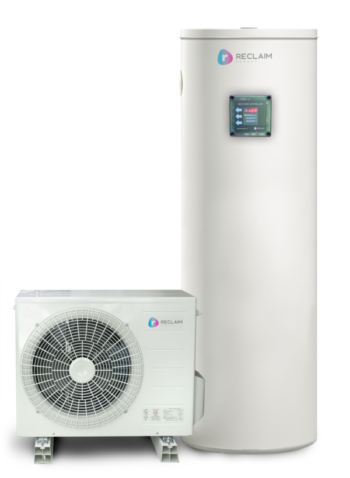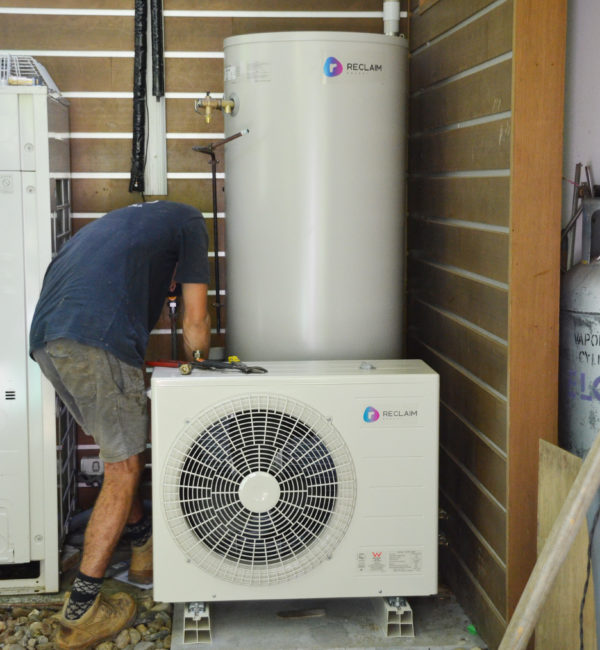CO2 Heat Pump Hot Water Systems
Hot water heating is expensive, often relying on inefficient electric hot water systems that use huge amounts of energy. Recent studies have found that hot water heating contributes significantly to the overall energy usage and the carbon footprint of a household. Switching to an energy efficient hot water system will save you money and benefit the environment.
With government rebates available, households now have an opportunity to purchase an energy efficient hot water system at an upfront price that’s competitive with traditional systems. That means you’ll have low upfront costs with rebates, immediate cost savings on your electricity bill and you’ll reduce your carbon footprint by using considerably less electricity to heat your hot water. To calculate your potential rebates click here.
We want to make sure that communities in our area make the most of this opportunity, securing cost savings, reducing air pollution and moving towards an environmentally aware community.

Webinar – Solar Without Rooftops
Our Webinar provided a wealth of knowledge, click here to view the recording Solar Without Rooftops Webinar.
Interested in participating?
Already prepared to switch your hot water system over? Register your interest in a heat pump and a Expert Hot Water representative will get in touch.
What is a Heat Pump Hot Water System?
Hot water heat pumps are efficient electric storage tank systems that extract heat from the surrounding air, and the high quality heat pump, such as the one on offer through our bulk buy, is very efficient even in below zero temperatures. With efficiency levels 70-80% higher than our usual electric storage tanks, the Reclaim Energy heat pump will save you money on your power bills and significantly reduce your annual carbon footprint. In fact it is likely to pay for itself from your electricity bill savings over a 4-5 year period.
Heat pumps can be either integrated (with the tank and compressor together in one unit) or split, where the tank and compressor are separate. Both types of units need to be installed in a well-ventilated area.
The Reclaim Energy system on offer is a split system, with the compressor and tank separate from each other.
Why Choose a Reclaim Energy CO2 Heat Pump Water Heater?
- The heat pump water heater has been designed by an Australian company for Australian conditions
- No back up heater element is required (using a back up heater is an ineffective and costly way to heat your water). Be aware some heat pumps do have a back up heater element installed
- Suited to cold climates (most other heat pumps rely on a back up heater element in colder weather)
- Uses naturally occurring CO2 as the refrigerant (CO2 is non toxic, non-flammable, non-ozone depleting and has the lowest global warming potential (GWP) of any refrigerant)
- Glass lined storage tank is suitable for all water types including bore and rain water; a stainless steel tank with no glass lining is also available at a higher price
- Strong warranties
- User friendly external smart controller allows programming to individual household needs including times to take advantage of your solar PV system
Why use Reclaim Energy Technology?
A Reclaim Energy CO2 Heat Pump Hot Water System is a quiet system and the best performing heat pump in cooler climates like ours. It uses carbon dioxide, as a refrigerant, rather than toxic refrigerants.
A Reclaim Energy CO2 Heat Pump Hot Water System uses leading technology to draw energy in from the ambient atmosphere and transfers it into heat. Ozone friendly refrigerant (CO2) absorbs the heat, which then flows into a compressor, where it’s converted into a high temperature gas. It then passes through a condenser within the water heat exchanger and the water is heated and then stored in the hot water tank for later use. No backup booster is required.
This means the Reclaim Energy CO2 Heat Pump Hot Water System requires much less electricity to heat water when compared to conventional hot water systems. In fact, the system will save up to 80% of hot water energy costs, year after year. If it’s run off solar PV it will cost you absolutely nothing for your hot water.

Heat Pump Summary Comparison
| Hot Water Heat Pump Type | Hot Water Heat Pump Type Approximate Cost (after rebates) | Examples | Pros & Cons |
| Premium | $4,000 to $5,000 | Sanden, Reclaim | Quieter, works in colder climates, more efficient, longer warranty, lower GWP* refrigerant, no electric element required. |
| Mid-Range | $2,000 to $3,500 | Quantum, Stiebel Eltron, Therman, Hydrotherm | More affordable. Noisier, uses an electric element (less efficient) for colder times, higher GWP* refrigerant. |
| Economic | $0 to $2,000 | Chromagen, Midea, Rheem | More affordable. Use an electric element (less efficient) for colder times, higher GWP* refrigerant. Less proven, risk of failure, shorter warranties |
*GWP – Global Warming Potential
Q & A
Solar Without Rooftops / Heat Pumps
| Will the YV-CPHub seek special packages for electricity & gas suppliers to the Yarra Valley | This is an option which we have talked about but as we have been funded for only one year it is not practical at this point. If we can secure longer term funding it is a real possibility. |
| What is meant by tapping into my neighbour’s solar feed, and whether this depends on how many neighbours have solar panels installed that they are feeding into a grid. | As we are all physically connected via the electricity grid (poles and wires), we are all essentially sharing electricity from the grid at any time. As now over 3 million homes in Australia have rooftop solar, in the middle of the day if you use electricity from the grid, and you have a neighbour who is exporting solar, then it could be said you are using their solar. Even if you don’t have a neighbour with solar, now that there is so much solar in the grid on the east coast 5 state grid, daytime electricity usage is predominantly solar supplied. And if we use more daytime electricity then we relieve some of the challenges in integrating more solar (and wind) to support investment in more solar in the future, without having to wait for storage. |
| I have an older style battery storage system and only six panels. I would like assistance in upgrading and/or helping make a plan to move forward. | You can do this yourself by contacting Solar Savers. They are backed by Councils in our region and are supported by Healesville CoRE. Otherwise contact a local installer or two or three to get quotes and info re what your options are. |
| Battery storage. Particularly without Solar PV but storing from the grid to use later. There are retailers who give you a cheaper rate if they can use your battery to draw on. Are there any plans to do this locally? | Solar Quotes have a list of all battery virtual power plant schemes nationally – https://www.solarquotes.com.au/battery-storage/vpp-comparison/ Tesla & Energy Locals one is available in SA and Victoria – https://www.tesla.com/en_AU/tep |
| Battery retrofits | Batteries are easily retrofitted to any home or solar home in most cases. But it depends and would be best to speak to a local solar and battery company |
| How to use a heat pump with a rural water supply and my own pressure pump. | The water must meet the minimum water quality per the warranty brochure given here, and if it does not meet, then a consultation must be made with water treatment companies. https://reclaimenergy.com.au/wp-content/uploads/2020/09/Reclaim-Warranty-TCs-Issue04-Sep2020-web.pdf The minimum pressure to run the system must be 220 kPa at tank level. |
| Detail on how to switch our electric HWS to daytime heating to make use of our solar power. There was a brief mention of needing an electrician and a technical term which I did not understand. We have tried turning it to Day rate rather than off peak but that was expensive. | They will need a sparky to come and put a timer on the system. |
| How much the Gov. would contribute towards a heat pump | See our the Pricing Table above for details on the Govt contributions: |
Case Studies
Hear what other people have to say about their experiences of the Reclaim Energy Heat Pump.
Further information from Reclaim Energy
To learn more about Reclaim Energy, click here.